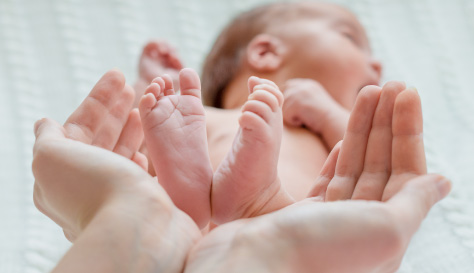Baby Massage
Understanding baby massage and how it can help your little one

Baby massage is not a new phenomenon for modern mums as many of us may believe, in fact, it is a practice that has been used for hundreds of years. The benefits of baby massage for your little one are endless, and there are even some benefits for you too.
It is known to be a great way to bond with your baby, but research also shows that the regular practice of baby massage can ease the symptoms of reflux, constipation and teething and is even shown to help mums suffering with postnatal depression, it’s a win, win!
What is baby massage?
Baby massage is a process where a baby is lovingly held and stroked. Mums and dads (or any other person special to the baby) use specially formulated oils and follow a sequence of soothing strokes and holds while making eye contact and chatting or singing.
What’s so good about it?
The International Association of Infant Massage (IAIM) explain the four categories that show the benefit of baby massage:
- Interaction: this is a focused time where you are bonding with your baby by lovingly touching them and talking or singing to them.
- Stimulation: The specific strokes focus on different areas of the body. Touching your baby helps him to make sense of himself and start to work out how different parts of the body move and work. Massage stimulates the nervous system which regulates our organs so it can help to keep the heart beat steady.
- Relief: Research shows that baby massage can help to alleviate symptoms of colic, reflux, constipation and even teething. Special strokes around the cheeks, ears and jaw can help with teething grumbles, while movements around the tummy and legs can aid digestion and wind.
- Relaxation: This is not bath time, or nappy changing, or going out, or playing, or eating…or any of the other fantastic, but sometimes quite chaotic things you do to have fun with your baby. It’s a calm, focused activity which is great for you too.
…and relax….
In a recent study of dads taking part in baby massage classes (1) the stress levels experienced by the men were significantly lower at the end of the course than at the start. If adults are stressed, babies pick up on it. Your baby can hear it in your voice and may feel it in the way you touch them. This, and skin on skin contact, releases the feel-good chemical, Oxytocin into the body, helping the adult and baby relax.
How and when do you give a baby a massage?
You can start massaging your baby almost straight from birth. Choose a warm, quiet place where you won’t get interrupted and put something comfy like a towel or a blanket under your baby. An oil or cream will help your fingers move over their skin more easily. If you’re using a new oil it’s a good idea to test a little patch of your baby’s skin the day before you want to start massaging, just in case he has a reaction. Your baby should be in a state known as ‘quiet alert’. This is usually when he’s not hungry, tired, crying, wanting to play, move around or needing a nappy change.
A baby massage class can teach you the correct strokes to use and the sequence to follow. Once you’ve done that, you can take the skills home with you, confident that you can massage your baby whenever he is ready and willing. IAIM says that as well as specific strokes, you should also be taught to learn cues from your baby so that you are only massaging him when he feels like it.
Massage at a glance
- You can massage your baby at any age
- You can massage your baby at any time of the day (If they are in the right mood)
- It doesn’t have to stop at his 1st birthday: you can carry on massaging your child right if he’ll let you!
- Massage can benefit all babies and can be particularly beneficial for those born prematurely and those with specific medical or developmental needs.
- It’s a great way for dads to get involved and feel close to their child.
- If you can, try to go to a baby massage class or course to begin with.
- The social aspect of a class and the chance to chat with other mums and dads can be just as beneficial to your own healthy mental state as the techniques you’re learning about are for your baby.
Are there times when baby massage should be avoided?
- You should never wake a baby to give them a massage. Even if you’ve paid for a class, it is best to let them sleep. You can still watch and learn or there might be a doll you can practise on while your baby sleeps
- Follow your baby’s cues. If he seems agitated or doesn’t seem to want to be touched, don’t push it. It’s supposed to be a loving, bonding, relaxing experience that won’t happen if he’s not in the mood!
- If your baby was born prematurely or suffers from a medical condition such as cerebral palsy you should check with a health visitor or GP before getting started, but almost all babies can be massaged.
Where can I sign up to a course?
Some hospitals and many Sure Start centres offer baby massage classes. Your GP surgery or local parenting group on social media may have information about a nearby course or you could check out WWW.IAIMbabymassage.co.uk for a list of accredited classes in your area.